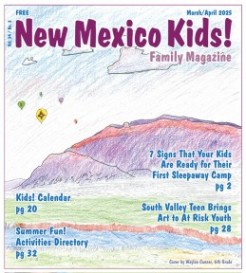Great Kids!
Great Kids!
August 14, 2023By TANIA SOUSSAN

Growing up in the South Valley, 15-year-old Cheyenne Anderson often came up against negative stereotypes about her neighborhood.
“I got a lot of hate thrown at me,” she said, adding that people told her the South Valley was dangerous and dirty.
Now she and her friend Isabel James, 15, are putting together a book of photos and poems to change those perceptions and empower younger children to feel good about themselves and where they live.
The Bosque School teens are collaborating with local painter Bill Mohr and Pulitzer Prize nominated New Mexico poet Jimmy Santiago Baca as well as other famous and amateur poets.
“Most of the books our young people are getting now are being pushed and published by global corporations and very few or any at all deal with issues we are facing today – immigration, injustice, prison reform, environmental disasters – and (they) always have those victims being people of color,” said Santiago Baca. “There are other books like Cheyenne and Isa’s that can flip it and show special moments that make up the uniqueness of our communities.”
Mohr is the Anderson’s neighbor. He was interested in publishing his paintings, which depict iconic South Valley scenes and buildings such as Taqueria El Paisa, Chavez Martial Arts, food trucks and men selling paletas. Anderson suggested they add poems. She and James put the word out for submissions in the area and at their school. They also approached the foundation of the late poet Mary Oliver, a favorite of Anderson’s, and received permission to print one of her poems.
“My main goal is so people from the South Valley, especially young children, can see themselves in a book, see their own neighborhood,” Anderson said.
James agreed, adding that she wants to “show people the South Valley is more than you read in the headlines.”
The childhood friends, who both play varsity sports and are active community volunteers, plan to self-publish and distribute the book to schools and Little Free Libraries in the South Valley. They created an Instagram account, @southvalleybook, and Anderson has been interviewed by KRQE-TV, KOAT-TV and KOB-TV.
Anderson connected with Santiago Baca through her father, who is a photographer. Santiago Baca has invited the girls to participate in a writing workshop later this year.
Both girls volunteer at La Plazita Institute, a nonprofit which works with former gang members and formerly incarcerated youth, and at Crossroads for Women, a shelter for young women coming out of prison. La Plazita is a “place to come back to and be part of the community,” Anderson said.
Los Angeles poet Luis J. Rodriguez, who works with La Plazita Institute and local South Valley youth, also contributed a poem.
“The poems we will feature in our book will address tough issues in our community like poverty, gang violence, school dropout rates, school shootings, the pandemic, racism,” Anderson said. “We want young people in our community to see themselves and where they live in the book.”




